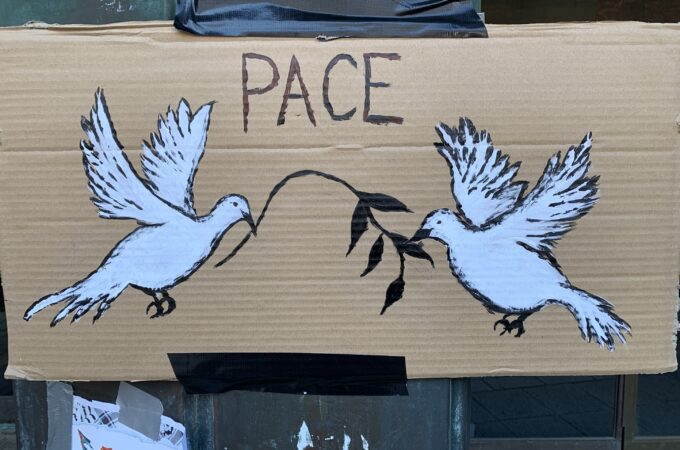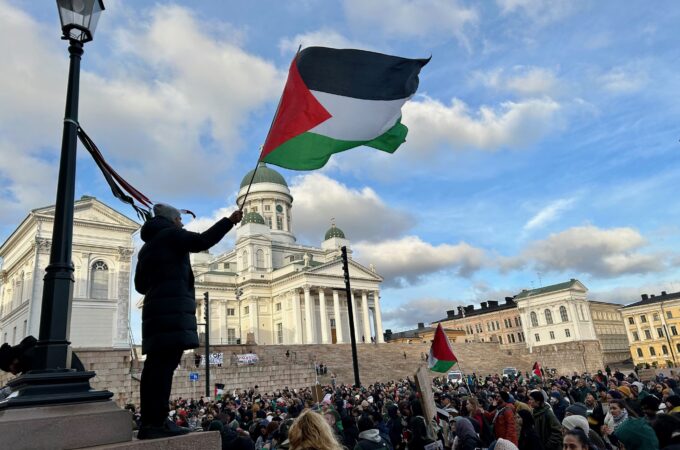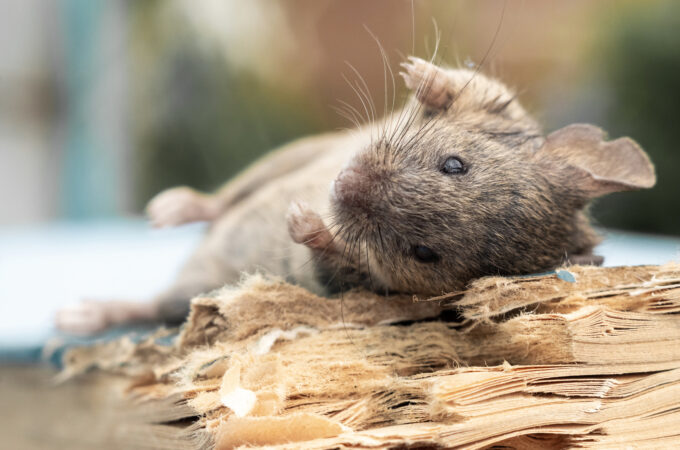
Unmasking the State of Israel’s Genocidal Tactics: Insights on Dehumanization, Animalization, and Veganwashing
This text is available also in Finnish. Teksti on luettavissa tästä myös suomeksi.
As critical animal studies scholars, we join academics worldwide to show unwavering solidarity with the people of Palestine and all civilians affected by recent atrocities. In this letter of support and short essay, we call for an immediate ceasefire and an end to both the killing of Palestinian people and Zionist settler colonialism.
We are deeply devastated about the loss of life and the escalating humanitarian catastrophe in Gaza. We urge the Finnish government, universities, and NGOs to condemn the genocidal war that has already taken more than 11,084 Palestinians lives, most of them women and children. The reported death toll varies based on whether it includes victims who are still trapped under the rubble. Some sources have announced as many as 17,144 deaths.
In addition to our expression of solidarity, we wish to offer some insights into how critical animal studies might contribute to the problematization of the colonialist framework of the ongoing genocide and ethnic cleansing. We focus specifically on dehumanization, animalization, and the problem of “veganwashing,” building on the scholarship of postcolonial and decolonial scholars.
1. Dehumanization as a genocidal tactic
On 15 October, Birzeit University, located in the West Bank of Palestine and with offices in the Gaza Strip, issued an open letter directed at international academic institutions, urging them to take tangible measures in opposition to the ongoing genocidal war. In the preceding weeks, numerous letters of support and petitions have emerged in response to this call for action. It is noteworthy that support for Palestine within the academia has also faced attempts of silencing. This underscores the imperative of publicly demonstrating support for our colleagues in Palestine and the people in Gaza during this critical time.
Responding to Hamas’s violent attack and killings of about 1,200 Israeli civilians and soldiers and the seizure of approximately 240 hostages by the militant group on October 7, 2023, the Israeli colonial administration imposed ”a complete siege” in the Gaza Strip. The siege resulted in Gaza residents being deprived of water, food, electricity, fuel, and medicine. The situation is worsening with each passing day, particularly in northern Gaza, which is currently surrounded by Israeli ground forces and facing relentless bombardment targeting hospitals and civilians. Despite instructing Palestinians to evacuate to the south, the Israeli military has continued bombing in that region as well, intensifying the worsening humanitarian crisis.
UN experts and researchers have called Gaza the ”world’s largest open air prison.” Similar to the circumstances prevailing in the West Bank, East Jerusalem, and the Golan Heights, Gaza has remained under Israeli settler colonialism and occupation since 1967. The over 2 million population residing in Gaza has endured an unlawful Israeli blockade that encompasses air, sea, and land access, effectively isolating them from other occupied Palestinian Territories and the rest of the world. Leading up to the outbreak of the recent military violence, the year 2023 had already become the deadliest year since 2004, with more than 200 Palestinians killed by Israeli forces.
Palestinian sociologist and anthropologist Honaida Ghanim (2008) has argued that the notion of biopolitics developed by French philosopher Michel Foucault (1978) to analyze the management of European populations is insufficient to describe the settler colonial system of Palestine/Israel. Israel’s settler colonialism operates not only through the biopolitical regulation of the lives of Palestinians but also, and importantly, through killing. To expose this kind of politics of death, Ghanim therefore turns to the idea of thanatopolitics (Ghanim 2008, 67; Agamben 1998). As she reminds us, the politics of death operates through the targeted assassination of Palestinian activists, journalists, and political leaders, along with the entire apparatus of violence against Palestinians.
In The Wretched of the Earth (1963), psychiatrist and political philosopher Frantz Fanon, originally from the French colony of Martinique, examines dehumanization as one of the main mechanisms of colonialism. He emphasizes that dehumanization is used to regulate and control the minds and bodies of the colonized, ultimately legitimizing even genocide. These dehumanizing tactics include different processes of othering, systematic oppression, forceful assimilation, and the wiping out of a people’s own history and tradition (Fanon 1963, 14–15).
In short, dehumanization, as a colonial and racist tactic, seeks to produce certain populations as less-than-humans, to use US philosopher Judith Butler’s term (2009, 93), and to make them susceptible to different forms of violence.
As anti–Zionist Israeli-Irish political sociologist Ronit Lentin writes in Traces of Racial Exception: Racializing Israeli Settler Colonialism (2018):
“[I]n the Israeli case, dehumanizing racial classifications emanate from the aim of ensuring that Jewish Israelis live at the expense of the Palestinian other(s). Such dehumanization, based on separation, segregation, and self-segregation, affirms Israel’s control over discriminated Palestinian citizens and occupied and besieged subjects, whose lives are regulated by the Israeli state’s civil and military authorities through racial technologies of surveillance, population transfers, raids of Palestinian homes, the West bank checkpoints and separation wall, curfews, house and village demolitions, arrests and administrative detentions, the detentions of minors, practices of torture and interrogation, culminating in extrajudicial executions, as well as imprisoning and deporting asylum seekers and migrants, all of which render the Palestinians (as well as Israel’s non-Jewish others) subject to, and the object of Israeli rule.” (Lentin 2018, 88; see also Raster’s letter of support.)
These mechanisms of dehumanization serve to justify and normalize not only the killings of Palestinians but also the maiming of their bodies. In her work, US queer theorist Jasbir Puar (2017) argues that maiming can be understood as a systematic military tactic aimed at weakening and disabling the Palestinian population to impede resistance against settler colonial rule and occupation. In the past six weeks of Israel’s attack on Gaza, over 27,490 Palestinians have been injured.
As Ghassan Abu Sitta (2023), a Palestinian-British professor and plastic and reconstructive surgeon working in Gaza, explained with regard to the situation following the collapse of Gaza’s healthcare system: ”The wounded are no longer being treated for their injuries. They are being stabilized the best they could. Delayed treatment, especially in children, leads to delayed reconstruction and eventually increased disability.”
In addition to the tactics of dehumanization described above, we would like to highlight how dehumanization operates often through animalization—an aspect that has not yet received much analytical attention in relation to Israel’s legitimization of its genocidal war. We find this particularly significant, as scholars at Birzeit University have urged the international academic community to pay serious attention to the Israeli defense minister naming Gazans as “human animals” in his declaration of war.
2. The Violence of Animalization
As Fanon demonstrates, European colonizers designated African populations as subhuman, subjecting them to animalistic comparisons and treatment, while positioning themselves as the so-called “civilized” colonizers (Fanon 1963, 42–43). Israel is now implementing a similar tactic of animalization to justify the massive killings of civilians in Gaza. Israel has long been employing dehumanizing techniques, depicting Palestinians with animal-like terms. Recently, the tactic of animalization has intensified to legitimize genocide, with Israel openly expressing the aim of obliterating the Palestinian presence in Gaza and the West Bank.
In the past six weeks, we have witnessed several instances where Israeli military personnel, reservists, or representatives of the state have called Hamas fighters as “bloodthirsty animals,” “horrible, inhuman animals,” and “mice.” Depicting Hamas fighters as animals might be seen as a military tactic that The Israel Defense Forces (IDF) use to rationalize the killing of “enemy” combatants as “self-defense.”
Yet, it is worth reiterating that the IDF’s retaliatory attack must be understood within the larger historical framework of Israel’s colonialist occupation. Stating this is not to exonerate Hamas. However, the strategy of animalization must be understood in a broader context. The power asymmetry of the conflict should be kept in mind. Israel is one of the world’s leading military powers, while Palestinians do not have their own state nor army and live under Israeli occupation without the same human and citizenship rights as Israelis.
As pointed out by strategic management scholar Samer Abdelnour (2023, 334), Israel maintains a military-industrial complex that receives almost $4 billion USD annually in the form of US military aid. This enables the development and testing of weapons on the Palestinian captives and committing crimes against humanity with impunity (Abdelnour 2023, 334; see also Loewenstein 2023). Also our native country, Finland, engages in, and benefits from, the arms and other trade with Israel – a partnership we find highly problematic.
In our view, likening Hamas’s fighters to “animals” does not happen in vacuum. In contrast, it is linked to Israel’s broader colonial strategies, aiming to portray the Palestinian population as inhuman and dangerous, thereby justifying the perceived need for lethal punishment. Indeed, it is not only the fighters of the militant group who are animalized; the same tactic is being deployed in relation to Palestinian civilians as well.
In addition to being labeled “human animals,” Palestinians have also been denigrated as “animals that can no longer live,” and “snakes,” as well as “worms underneath the earth, above the earth, and in every way,” to only cite a few examples (Elia 2023, 23; Ghanim 2008, 73). As Ghanim stresses (2008, 73), depicting Palestinians as subhuman, semi-savage, and animal-like is a crucial aspect of the Zionist ideology. Rather than being just a recent rhetorical tool, animalization can be understood as Israel’s systematic colonial strategy.
Animalization also operates by rhetorically purifying the State of Israel of any aggression or violence, resulting in these characterizations being exclusively attached to Palestinians alone. With this rhetoric, Israel is constructed as an innocent victim that only claims the right of self-defense, while Palestinians are viewed as nothing but violent attackers and a perpetual threat (Butler 2012).
Not surprisingly, then, Israel’s Prime Minister Benjamin Netanyahu has referred to the current situation as “a struggle between the children of light and the children of darkness, between humanity and the law of the jungle.” As this indicates, Palestinians are equated to something akin to “state of nature,” where the only driving force is raging animal aggression, a behavior that takes the form of “to kill or to be killed.”
In this way, animalization blurs the distinction between a combatant and a civilian – a crucial differentiation according to international humanitarian law. Treating all Palestinians as potential “enemies” and “terrorists” serves the very purpose of making civilians responsible for Hamas’s actions (Ghanim 2008, 74). As we are writing this text, Israel is heavily targeting Gaza’s hospitals to “destroy Hamas,” an aim that Israel uses to legitimize the killing of severely injured civilians, premature babies dependent on incubators, persons in labor, and displaced people trying to find shelter in hospitals that are already facing disastrous power outages.
Historically, the Jewish population has also been subjected to animalization, enduring centuries-long antisemitism in Europe. The discourse of animalization was a systematic and extensively documented strategy employed also by the Nazi regime against Jewish people, as well as others deemed racially unfit, including sexual minorities and disabled individuals (see, for example, Patterson 2002; Khazaal 2021, 10–11). The animalization served as an intentional component of their horrific oppression, laying the groundwork for their massive and organized destruction.
Although animalization must be understood as a historical tactic that operates in specific ways in different cultural and geographical contexts, we find it necessary to critically examine how the State of Israel, under its ultra-right government, currently utilizes animalization against Palestinians to constitute them as “killable.”
However, we also want to acknowledge that, as social cognitive neuroscientist and peace activist Emile Bruneau and political psychology scholar Nour Kteily (2017) demonstrate, dehumanization can take root on both sides of an active asymmetric conflict. Not only the powerful or privileged groups (Israel) are deploying the discourse of animalization but also the oppressed ones (Palestinians) (Bruneau & Kteily 2017).
As the above examples show, animalization can operate through different forms of racialization, such as antisemitism and islamophobia. The oppression of humans as “animals” is rooted in the deep-seated belief in a significant ontological and ethical distinction between humans and other animals (Matsuoka and Sorenson 2021). The existing normative hierarchy between humans and other animals is one more dimension in Israeli settler colonialism (Alloun 2017, 561; see also Braverman 2013, 2017). Even though all humans are classified as animals, equating Palestinians – or any other human population – with certain nonhuman animals, like “worms” and “snakes,” works as a violent tactic that enables them to be treated “like animals.”
Here, the phrase “like animals” refers to the normative and historical conception that nonhuman animals are inferior to humans, exposing them to myriad forms of violence. The violence of animalization can thus target not only human animals but also nonhuman animals (e.g. the different moral and legal status of pets and “food animals”). Labeling Palestinians – or any other animalized and racialized group – as animals is thus a means of depriving them of the moral position and entitlements associated with “humanity” (Elia 2023, 88, 156; see also Costello & Hodson 2010; Matsuoka & Sorenson, 2021, 115).
In other words, and as US posthumanist scholar Cary Wolfe (2010) notes, as long as animals are automatically denied ethical consideration solely based on their species, the process of dehumanization through animalization can easily be applied to any population or group – human or nonhuman – that are excluded from the ethnocentric “we.” Or, what Jamaican writer and cultural theorist Sylvia Wynter (2003, 262) calls “the globally hegemonic ethnoclass world of ‘Man.’”
For this reason, certain decolonial and Indigenous theorists, such as Billy-Ray Belcourt (2015) from the Driftpile Cree Nation, argue that considering the question of animalization – and animal ethics – are prerequisites of decolonization, and vice versa.
Numerous decolonial feminist scholars have highlighted the interconnected histories, rhetorics, and strategies between animalization, speciesism, and racism (e.g. Alloun 2018; Kim 2015; Lugones 2010). Therefore, an analysis of speciesism becomes essential when addressing and fighting injustices against marginalized human groups, including refugees, migrants, and colonized people (Matsuoka & Sorenson 2021, 119; Khazaal 2021, 26–27).
In the footsteps of these scholars, we propose an intersectional or a “multi-optic” approach (Kim 2015, 283) to problematize the ways in which racist, colonialist, and speciesist discourses reinforce each other, leading to systematic forms of oppression and violence against those categorized as “less-than-humans.” We wish to suggest that in order to fully understand and expose the depth of Palestinians’ oppression, it is paramount to call into question simultaneously the violent workings of dehumanization, animalization, and colonialism.
3. Veganwashing
Diaspora Palestine scholar, Nada Elia (2023, 127), draws attention to Israel’s systemic disinformation campaigns. Israel is renowned for practices such as pinkwashing, that is, ”appeal[ing] to LGBTIQ+ rights in order to deflect attention from its harmful practices” (Decolonize Palestine). On November 13, the State of Israel published a photo in social media showing an Israeli soldier wavering the rainbow flag in Gaza, a grotesque gesture of “human rights” amidst an ongoing genocide. As Elia (2023, 128) argues, in addition to pinkwashing, Israel also employs veganwashing that falls under the broader category of greenwashing.
As approximately 5% of Israel’s population identifies as vegans, the army of Israel furnishes vegan recruits with vegan equipment, including boots and berets, and offers vegan meals during service. Various Western environmental and animal rights organizations, such as PETA (People for the Ethical Treatment of Animals), have lauded this approach as an example of respecting individual moral choices and ethically sound practices (Elia 2023, 128).
Unfortunately, this position fails to acknowledge Zionist settler colonization which, as we have noted, operates through an ontological and ethical distinction between humans and those deemed inhuman, normalizing the animalization of Palestinian people. Praising the Israeli army for its “ethical” vegan options downplays the killing of Palestinians and the devastation of Palestinian farmers’ livelihoods. It also ignores the nonhuman animal victims of Israel’s military violence (Elia 2023, 128).
Portraying the Israeli army as “vegan friendly” serves as an additional method to enhance the image of Israel as “civilized” and morally progressive compared to Palestine. Framing the vegan option as an ethical “anti-cruelty” practice conceals the more systemic cruelties of settler colonialism and occupation. This kind of vegan posturing aims to present the Israeli army as ethically “progressive,” thereby masking the true objectives of its operation. Here, veganwashing reflects the prejudice of portraying Arabs as ignorant of animal suffering, contrasting them with civilized Europeans, an “Orientalist” stereotype as articulated by Palestinian American scholar Edward Said (1977, 38).
As Elia (2023, 116) writes with regard to the tension between veganwashing and the occupation of Palestinian lands:
[W]hat Palestinians experience […], however, is the poisoning and desertification of their lands, the theft of their water, the criminalization of their foraging traditions, and the uprooting of thousands of their ancient olive trees. As for the vegan Israeli soldiers, they drop bombs, not falafel patties, on Palestinian homes, schools, and hospitals. (Elia 2023, 116.)
Prior to the outbreak of violence in October 2023, a majority of Gaza’s population had adopted a vegan diet – not out of choice but as a result of food being weaponized as a means of starvation (Elia 2023, 124, 134). This is part of the Israeli state policy to put the Palestinians on a diet, but not to make them die from hunger (Ghanim 2008, 76–77). As Elia emphasizes, the local food systems in Gaza were already significantly crumbling due to the prolonged blockade long before the recent bombings began (Elia 2023, 134). Amidst the recent military violence and intensified siege, food, and clean water are scarce, leading to starvation, dehydration, and serious illnesses, furthering the genocide.
Bearing these issues in mind, we call for critical analyses of the ways in which veganism as an ethico-political praxis of animal liberation is turned rhetorically into an example of the moral progressiveness of the Israeli military and the State of Israel. Here we want to highlight the insight of many US Black vegan scholars and activists (see e.g., Harper 2013; 2010; Ko and Ko 2017; Adewale 2021): as long as animal liberation is thought of in isolation from other struggles against injustices – in this case racism and settler colonialism – it remains difficult if not impossible to problematize the violent workings of dehumanization/animalization.
Finally, as Alloun (2020, 36) emphasizes, to truly expose the epistemic and physical violence linked to Israeli veganwashing and the ongoing perpetuation of settler colonial logic, it is essential to give voice to Palestinians: to both human rights and animal activists. The Palestinian Animal League, for instance, seeks to problematize both the colonial occupation and the oppression of nonhuman animals. Affirming their work, we want to adopt – and encourage others as well – a politics of listening in order to join the struggle for interspecies justice, and most urgently, Palestinians’ freedom.
Call for Action
As a concluding part of our essay, we urgently call for these concrete actions against Israeli state’s dehumanizing and animalizing violence:
- The Finnish government and the European Union must demand an immediate ceasefire, an end to the ongoing genocidal war on Palestinians, and take urgent measures to facilitate humanitarian aid to Gaza. All civilians must be protected in Gaza, the West Bank, and Israel.
- The Finnish government must cease arms and other trade with Israel, and withdraw its political support from Israel in protest at its violation of International Humanitarian Law and its ongoing illegal occupation of Palestinian territories. Finland must actively endorse the peace and democracy movements in the region, and recognise the right of Palestinians to freedom and self-determination.
- Researchers, universities, and other academic institutions must suspend their cooperation with the State of Israel, including Israeli universities following the BDS academic boycott campaign. Universities must protect academic freedom of speech and not silence students and staff showing solidarity with Palestinians.
- Media must maintain a vigilant stance against perpetuating racist and colonialist frameworks. Journalists must commit to ‘verified facts, provide the broader historical perspective, and call out all abuses of power.’
- In addition, we encourage fellow critical animal studies scholars and animal rights organizations to actively support the struggle for Palestinian liberation. We urge them to use their platforms to vocally oppose the genocidal war and to stand in solidarity with Palestinians.
We would also like to express our deep concern regarding the rise of anti-Semitism, Islamophobia, and anti-Arab racism observed in various regions worldwide over the past weeks. Furthermore, we also answer the call from academics and university staff in North East Syria in condemning the Turkish bombings in the nearby region. While Israel began bombing Gaza on October 7th, between the 5th and 10th of October, the Turkish regime targeted vital civilian infrastructure in Kurdish-led North East Syria, causing 48 casualties. Despite Turkish President Recep Tayyip Erdoğan condemning the killing of Palestinians, the Turkish regime was responsible for Kurdish deaths in North East Syria during the same period. It is important to note that Finland persists in arms trade with both the Israeli and Turkish states.
Lastly, we express our gratitude to the Raster network for their prompt letter following Israel’s assault on Gaza. Their expertise, in guiding us towards sources and analysis, was invaluable in our writing process. Special thanks to our colleagues for their assistance in providing insightful and critical comments on our text.
Freja Högback, Doctoral researcher, M.Soc.Sci, Gender Studies, Åbo Akademi University
Sanna Karhu, PhD, M.Soc.Sci, philosopher, project leader, Gender Studies, University of Helsinki
Lumi Kauppinen, Doctoral researcher, M.Soc.Sci, Journalism, Tampere University
Helinä Ääri, PhD, literary scholar, European and World History, University of Turku
The authors are critical animal scholars with an interest in feminist and intersectional research, theory, and praxis. The views presented in this article do not necessarily reflect the official position of the Network for Critical Animal Studies in Finland or the Editorial Board of the Eläimiksi website.
Letters of support and petitions
RASTER letter of support for Palestinian resistance
Academic workers and scholars in the Nordics: Declaration of solidarity with the Palestinian people
Literature
Abdelnour, Samer (2023) Making a Killing: Israel’s Military-Innovation Ecosystem and the Globalization of Violence. Organization Studies 44:2, 334–337.
Adewale, Omowale, & Harper, A. Breeze (2021) Brotha vegan: Black men speak on food, identity, health, and society. New York: Lantern.
Agamben, Giorgio (1998) Homo Sacer: Soveriegn Power and Bare Life. Stanford: Stanford University Press.
Alloun, Esther (2020) Veganwashing Israel’s Dirty Laundry? Animal Politics and Nationalism in Palestine-Israel. Journal of Intercultural Studies 41:1, 24–41.
Alloun, Esther (2018) ‘That’s the beauty of it, it’s very simple!’ Animal rights and settler colonialism in Palestine–Israel. Settler Colonial Studies 8:4, 559–574.
Belcourt, Billy-Ray (2015) Animal Bodies, Colonial Subjects: (Re)Locating Animality in Decolonial Thought. Societies no. 5, 1–11.
Braverman, Irus (2017) Captive: Zoometric Operations in Gaza. Public Culture 29:1. 191–215.
Braverman, Irus (2013) Animals Frontiers: A Tale of Three Zoos in Israel/Palestine. Cultural Critique no. 85. 122–62.
Bruneau, Emile & Kteily, Nour (2017) The enemy as animal: Symmetric dehumanization during asymmetric warfare. PLoS ONE 12:7. e0181422.
Butler, Judith (2012) Parting Ways. Jewishness and the Critique of Zionism. New York: Columbia University Press.
Butler, Judith (2009). Frames of War. When Is Life Grievable? New York: Verso.
Costello, Kimberly and Hodson, Gordon (2010) Exploring the Roots of Dehumanization: The Role of Animal-Human Similarity in Promoting Immigrant Humanization. Group Processes and Intergroup Relations 13:1. 3–22.
Elia, Nada (2023) Greater than the Sum of Our Parts. Feminism, Inter/Nationalism, and Palestine. London: Pluto Press.
Fanon, Frantz (1963) The Wretched of the Earth. New York: Grove Press.
Foucault, M. (1978) The History of Sexuality. New York: Vintage.
Ghanim, Honaida (2008) Thanatopolitics: The Case of the Colonial Occupation in Palestine. In Thinking Palestine (Ed.) Ronit Lenṭin. London: Zed Books.
Harper, Amie Louise (2013) Vegan Consciousness and the Commodity Chain: On the Neoliberal, Afrocentric, and Decolonial Politics of “Cruelty-Free”. Doctoral dissertation. University of California. https://sistahvegan.files.wordpress.com/2013/03/harperpdftelfordupdates.pdf
Harper, Breeze (2010) Sistah Vegan: Black Women Speak on Food, Identity, Health, and Society. New York: Lantern.
Khazaal, Natalie (2021) Introduction. Is there animalization without speciesism? In Like an Animal: Critical Animal Studies Approaches to Borders, Displacement, and Othering (Ed.) Natalie Khazaal & Núria Almiron. Leiden/Boston: Brill Rodopi, 8–27
Kim, Claire Jean (2015 ) Dangerous Crossings: Race, Species and Nature in a Multicultural Age. New York: Cambridge University Press.
Ko, Aph and Ko, Syl (2017) Aphro-ism: essays on pop culture, feminism, and black veganism from two sisters. New York: Lantern.
Lentin, Ronit (2018) Traces of Racial Exception: Racializing Israeli Settler Colonialism. London: Bloomsbury.
Loewenstein, Antony (2023) The Palestine laboratory: How Israel exports the technology of occupation around the world. London: Verso.
Lugones, María (2010) Towards a Decolonial Feminism. Hypatia 25:4, 743–759.
Matsuoka, Atsuko & Sorenson, John (2021) “Like an Animal” Tropes for Delegitimization. In Like an Animal: Critical Animal Studies Approaches to Borders, Displacement, and Othering (Ed.) Natalie Khazaal & Nuria Almiron. Leiden/Boston: Brill Rodopi, 101–124.
Patterson, Charles (2002) Eternal Treblinka: Our Treatment of Animals and the Holocaust. New York: Lantern Books.
Puar, Jasbir (2017) The Right to Maim. Debility, Capacity, Disability. Durham: Duke University Press.
Said, Edward (1977) Orientalism. London: Penguin.
Schirch, Lisa (2023) A 5-point Peace Plan to Protect Civilians, Address Trauma, Invest in Democracy, and Dismantle Hamas and the Israeli Occupation. Toda Peace Institute. Policy Brief No. 176.
Wolfe, Cary (2010) Before the Law: Animals in a Biopolitical Context. Law, Culture and the Humanities 6:1, 8–23.
Wynter, Sylvia (2003) Unsettling the Coloniality of Being/Power/Truth/Freedom: Towards the Human, After Man, Its Overrepresentation—An Argument. CR: The New Centennial Review 3:3, 257–337.
Online sources
Aljazeera 14.10.2023. “These animals can no longer live” says Israel’s oldest reservist
BDS-movement. Why boycott Israeli universities?
Birzeit University Open Letter Oct 15 2023
MEE 9.10.2023. Israel-Palestine war: ’We are fighting human animals’, Israeli defence minister says
NY Times 4.11.2023 Israel Takes Journalists to Combat Zone in Gaza While Blinken Visits Jordan
NY Times 9.10.2023. Israel Orders ‘Complete Siege’ of Gaza and Hamas Threatens to Kill Hostages
OCHA 10.11.2023. Hostilities in the Gaza Strip and Israel – reported impact | Day 44.
Palestinian Animal League (PAL)
RASTER letter of support for Palestinian resistance. Raster Network. 16.10.2023.
Yle News 27.10.2023. Defence minister stands by Finland’s arms deal with Israel.
Yle News 12.11.2023. Finland and Israel sign major defence deal
Image: Lumi Kauppinen





